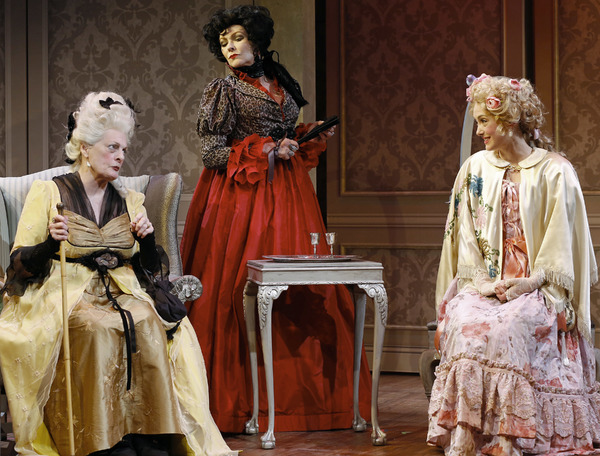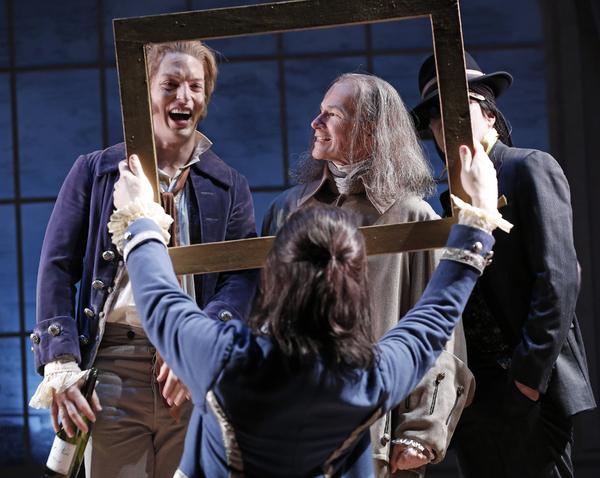
Mrs. Candour (Dana Ivey), Lady Sneerwell (Frances Barber), and Lady Teazle (Helen Cespedes) take part in idle chatter in Richard Brinsley Sheridan’s THE SCHOOL FOR SCANDAL
Red Bull Theater at the Lucille Lortel Theater
121 Christopher St. between Bleecker & Hudson Sts.
Tuesday – Sunday through May 8, $80-$100
212-352-3101
www.redbulltheater.com
Red Bull Theater’s wonderfully playful adaptation of Richard Brinsley Sheridan’s classic 1777 farce, The School for Scandal, offers a master’s course on the subject of malicious idle chatter. The headmistress of this unofficial institution is Lady Sneerwell (Frances Barber), a wealthy widow with an ax to grind. “I am no hypocrite to deny the satisfaction I reap from the success of my efforts,” she tells her vitriolic star pupil, gossip columnist Snake (Jacob Dresch), continuing, “Wounded myself, in the early part of my life by the envenomed tongue of slander, I confess I have since known no pleasure equal to the reducing others to the level of my own injured reputation.” Joined by single heiress Maria (Nadine Malouf) and aristocratic gadfly Joseph Surface (Christian Conn), the group discusses the nature of gossip. “For my part, I confess, madam, wit loses its respect with me, when I see it in company with malice. What do you think, Mr. Surface?” the prim and proper Maria asks, to which Joseph replies, “Certainly, madam. To smile at the jest which plants a thorn in another’s breast is to become a principal in the mischief.” Lady Sneerwell chimes in, “Pshaw, there’s no possibility of being witty without a little ill nature. The malice of a good thing is the barb that makes it stick. What’s your opinion, Mr. Surface?” Joseph again shares his barbed judgment, explaining, “To be sure, madam, that conversation where the spirit of raillery is suppressed will ever appear tedious and insipid.” But the gossip they spread is anything but good-natured teasing, carefully aimed at directly affecting its targets. Referring to the never-seen Mrs. Clackit, Snake boasts, “To my knowledge, she has been the cause of six matches being broken off and three sons being disinherited, of four forced elopements, as many coerced confessions, and two divorces.” One of their current targets is Sir Peter Teazle (Mark Linn-Baker), an older city knight and avowed bachelor who has married the much younger Lady Teazle (Helen Cespedes), who is happily going through his money while flirting with Joseph, who prefers Sir Peter’s ward, Maria, who has a hankering for Joseph’s younger brother, Charles (Christian DeMarais), who is drinking away his fortune. The silly dandy and ersatz poet Sir Benjamin Backbite (Ryan Garbayo) also has his heart set on Maria. The Surface brothers have been receiving funds from their uncle, Sir Oliver (Henry Stram), who has been traveling the world for sixteen years but at last returns, deciding to test his nephews’ loyalty by appearing in disguise to determine whether they are still worthy of his financial support. And ruling over it all is the master gossip herself, Mrs. Candour (Dana Ivey), who declares without a hint of irony, “Tale-bearers are just as bad as the tale-makers — but what’s to be done, as I said before — how will you prevent people from talking?”

Charles (Christian DeMarais) and his disguised uncle, Sir Oliver (Henry Stram), frame their immediate future in THE SCHOOL FOR SCANDAL
In his directorial debut, Marc Vietor assuredly guides all the delicious madness, but he has to play second fiddle to Andrea Lauer’s sensational period costumes and Charles G. LaPointe’s outrageous wig and hair design; Dresch’s green reptilian getup as Snake is worth the price of admission alone, as is the way he marvelously squirms and slithers onstage, and Ivey’s wig is like a character unto itself. The excellent cast has tons of fun on Anna Louizos’s set, which folds into drawing rooms in various residences. Ivey and Barber are particularly adroit at chomping on the scenery and spitting out their wickedly delicious calumny. Several characters present asides directly to the audience, which works for the most part except for Stram, whose attempts are hard to understand. The Dublin-born Sheridan, who wrote such other plays as The Rivals, A Trip to Scarborough, and Pizarro and was also a politician who served in the British Parliament for more than three decades, doesn’t hold anything back in this consistently engaging satirical comedy of manners, beginning with the names of the characters themselves; in addition to Candour, Snake, Sneerwell, Backbite, Surface, and Teazle, there are Crabtree, Midas, Bumper, and Careless onstage as well as references to Prim, Brittle, Clackit, Knuckle, Kumquat, and Gadabout. In his diary entry for December 17, 1813, Lord Byron wrote, “Lord Holland told me a curious piece of sentimentality in Sheridan. The other night we were all delivering our respective and various opinions on him and other hommes marquans and mine was this: — ‘Whatever Sheridan has done or chosen to do has been, par excellence, always the best of its kind. He has written the best comedy (School for Scandal), the best opera (The Duenna — in my mind, far before that St. Giles’s lampoon, the Beggars’ Opera), the best farce (The Critic — it is only too good for an after-piece), and the best address (Monologue on Garrick); and, to crown all, delivered the very best oration (the famous Begum Speech) ever conceived or heard in this country.” It is with no mere prattle that I say that Red Bull Theater has done us all a service by resurrecting this play that is nearly as old as our country, which itself has never stopped loving and spreading gossip, which can now go viral over the internet in the matter of minutes. “There’s no stopping people’s tongues,” Mrs. Candour says. “The license of invention some people take is monstrous indeed,” Joseph adds. Thank goodness those sentiments are true, for they result in such a rich and savory treat as The School for Scandal.